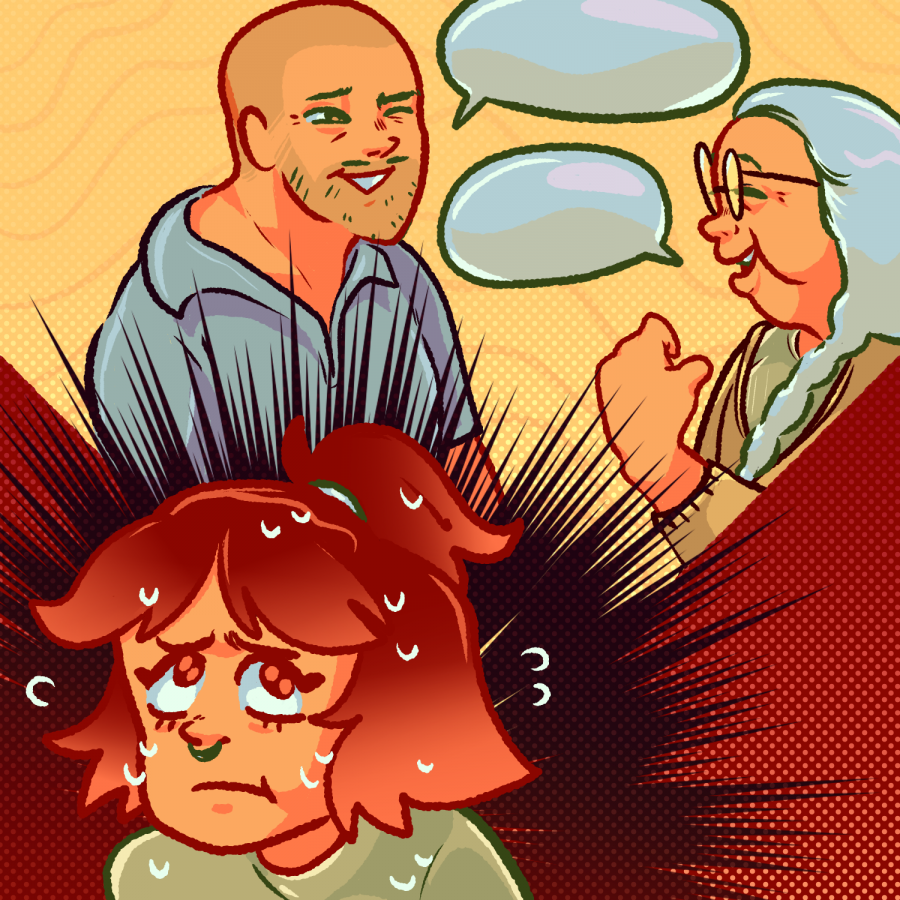Hispanic students connect to culture in ways other than language
October 6, 2021
Editor’s Note: This article first appeared as part of the September 24 flipbook.
While visiting family in Tamaulipas, Mexico, Francisco Reyes found himself lost, sifting through a constant stream of Spanish, understanding but unable to reply. Using his parents as translators, Reyes felt disapproval from his older relatives.
“It felt so disheartening,” the kinesiology sophomore said. “It made me wish I could trade English for Spanish. I couldn’t even talk to my family, the people who are around me and are there for me.”
According to the Pew Research Center, from 2000 to 2019, the number of Hispanics who grew up in the U.S. speaking Spanish decreased by 8%. As fewer Hispanics learn Spanish at home, many grow up feeling out of touch with their culture and learn to engage with identity through other means.
After Reyes’ grandmother, who spoke Spanish with him, passed away before he started kindergarten, he struggled learning both Spanish and English. His parents preferred for him to focus on English, and, as a result, he practiced Spanish less. Reyes said his Hispanic peers teased him for not being a Spanish speaker.
“They would crack jokes and (say), ‘How do you not know Spanish, aren’t you Hispanic?’” Reyes said. “Over time it made me feel very insecure about myself. I felt like I wasn’t Hispanic (and) was missing something.”
By the end of his junior year of high school, Reyes said he felt fed up with not being able to communicate in his native language. He asked his parents to only speak to him in Spanish, consumed only Spanish media and slowly picked up the language.
“There’s still that part of me that’s that insecure kid who feels like he doesn’t know Spanish,” Reyes said.
Because her father only speaks English, psychology senior Alyssa Rosales said her parents chose not to speak Spanish to make things easier at home. Though she took Spanish classes in high school, Rosales said she missed out on learning slang and cultural references.
To connect with her identity, she competed in Miss Teen Texas Galaxy and Miss Teen Austin Belleza Latina pageants starting at age 14. Still, Rosales said she often felt disapproval from her Spanish-speaking competitors.
“I’m a very proud Latina,” Rosales said. “(But) it’s hard to connect to (my culture) because there’s a lot of people who speak Spanish (who) think less of you.”
While growing up in Brownsville, a 93.8% Hispanic city, Bella Vargas, a communication and leadership senior, said her classmates often joked about her not being Hispanic because she couldn’t talk to them in Spanish.
“They would say, ‘Oh my god, you’re such a white girl.’” Vargas said. “Why am I white? I’m Hispanic. … Just because I don’t know our native language doesn’t mean I’m not Hispanic.”
Vargas said even though she doesn’t speak fluent Spanish, she appreciates her culture by learning Mexican recipes and celebrating Hispanic holidays.
“There’s other things that make us who we are,” Vargas said. “(We can still be) authentic and true to our colors.”
Like many younger Hispanics in America, radio-television-film freshman Miranda Hernandez struggled with Spanish, so she stuck to English growing up. To connect with her heritage, Hernandez enjoys listening to artists such as Enrique Inglesias, Pitbull and Selena.
“Selena (assures) me I’m a Latina,” Hernandez said. “She didn’t know Spanish so she’s my idol. I will get it one day. If she could do it, I can do it.”
Hernandez still regrets not being able to communicate with her paternal grandparents, who don’t speak English. At family gatherings, she said she feels like she doesn’t even know her older family members. Nevertheless, she still wants to connect with them and their culture.
“I don’t know Spanish but I am proud to be Hispanic,” Hernandez said. “I know language is a big part of a culture, but it’s not everything; I can be Hispanic in every way except language.”












